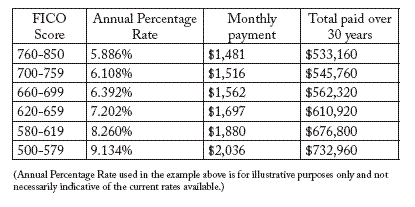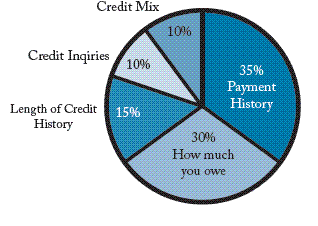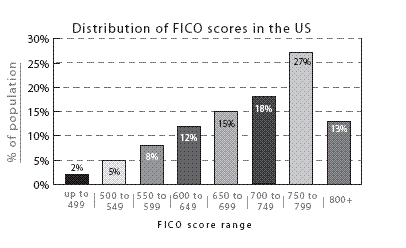Understanding
Credit Scores

What's
the big deal?
If
you lend someone money, you want to be sure you get paid back, right?
The same is true when you borrow money; whoever might lend you the
money wants to know how likely you are to pay them back on time
before they give it to you. A good way of predicting the chances
that you’ll hold up your end of the deal is to look at how
you’ve handled borrowed money (credit) in the past –
your credit history.
Any
credit you’ve been issued in the past gets reported to a Credit
Bureau along with your payment record. The Credit Bureau compiles
all that activity into a Credit Report, which is then run through
a complex algorithm created by Fair ISAAC to compute your credit
score. The better you are at paying back money at the agreed upon
terms, the higher your score. If you aren’t so good at handling
borrowed money … your score goes down. A lower score doesn’t
necessarily mean you can’t get a loan, but the lower it is
the more difficult it will be (and the more expensive it will be!)
to get someone to lend you more money.
The information below will give you a closer look at the nature
of a credit score and how vital it is to your financial health,
along with tips to build, maintain and improve your score as well
as how to address inaccurate information that might appear in your
report.
How Do Credit Scores Work?

In the United States and Canada, when people refer to a credit score
they are typically talking about your FICO score, developed by Fair
Isaac Corporation. FICO scores are the most widely used and accepted
credit scoring system and ranges from 300 to 850, with most people
landing in the 600 to 700 range (the higher the score, the better).
There are three different Credit Bureaus that gather, score and
sell this information. They are Equifax, TransUnion and Experian.
Components
Of FICO Score
When gathering and analyzing your credit activity, there are five
areas that make up your score. They are:
1. Your payment history – about 35% of a FICO score
2. How much you owe – about 30% of a FICO score
3. Length of credit history – about 15% of a FICO score
4. New credit/credit inquiries – about 10% of a FICO score
5. Other factors – about 10% of a FICO score

Payment History – 35% The first thing a Lender wants to know
is whether you’ve paid past credit accounts on time. Late
payments, bankruptcies and charge-offs will certainly hurt your
score, though the impact of each blemish diminishes as time goes
on; the more recent the problem, the more significant the impact
on your score. A regular history of on-time payments helps improve
your score.
How much you owe – 30% FICO scores look at the total amount
you owe on all accounts, how many of those accounts are carrying
balances and what your total credit limit is. The closer you are
to maxing out the credit available to you, the more your score will
be pushed down.
Length of credit history – 15% Generally the longer your credit
history is, the better. However, even a short but good credit history
can contribute to a higher score.
New credit/credit inquiries – 10% Opening several new accounts
in a short period of time represents a credit risk, which will negatively
affect your score. FICO scores do a good job of recognizing and
distinguishing between a search for multiple new lines of credit
and rate shopping for a certain loan. So, if you are looking for
a specific loan for a house or a car for example, it’s best
to do so in a short period of time, such as 14 days.
Other factors – 10% Your credit “mix,” or the
different types of credit you are managing, will have a small impact
on your overall score. While not necessary, showing that you can
manage Installment Loans (mortgage or auto loans) as well as Revolving
Accounts (credit cards and retail accounts) is helpful.
Are FICO Scores Only Measure Used To Determine Whether
I Get A Loan?
No. While FICO scores are very helpful, they don ’t paint
a complete picture, so most Lenders will look at a variety of other
criteria before making a credit decision. Some of these other factors
include your employment history, current employment and income,
the amount of debt you currently carry relative to that income,
as well as specific underwriting guidelines. Taking a look at the
complete financial picture may allow for someone with a low score
to be granted a loan while someone with a higher score may not.
The focus of this booklet however, is the FICO score.

While all three Credit Bureaus calculate your score in a similar
manner, not all creditors report to all agencies. Since they don’t
all have the exact same information, your score will vary somewhat
from one Bureau report to another. Certain Lenders may look at your
score from just one Bureau; however for a mortgage loan all three
will usually be compared.
What’s NOT In Your Scores?
Your FICO scores will never include information about your race,
color, religion, national origin, gender or marital status. In fact,
it is against the law for a Lender to consider any of this type
of information when making a credit decision, based on the Equal
Credit Opportunity Act. FICO scores are designed to be a non-biased
method to determine the likelihood of a person repaying a debt,
and independent research has confirmed this fact. In other words,
at any given score minorities and non-minorities are equally likely
to repay a debt at agreed upon terms.
Are There Other Implications To Having A Low FICO
Score?
Yes. Even though you may still be able to get a loan if you have
a lower FICO score, that loan will cost you more money… potentially
a lot more money. Let’s look at an example of how much a 30
year mortgage for $250,000 will cost you per month and over the
course of the loan, based on your credit score:
As
you can see in this particular example, a difference of less than
200 points in a FICO score added up to an additional $200,000 to
the borrower over the life of the loan. It pays to pay attention
to your credit!
“The FICO score has become the single most important indicator
used by Lenders to predict whether you will repay [a loan].”
– New York Times
You Can Check Your Own Credit Report
Now that you understand the significance of your credit score, let’s
take a look at how you can check to see how you measure up, and
what to do if you don’t agree with what you find.
Regardless of whether you’re about to ask for a loan for a
large purchase such as a car or a home or not, you would be wise
to review your Credit Report at least once per year.
Requesting
your own Credit Report directly from the Bureaus will not affect
your credit score, and each Bureau will provide you with one free
report per year (remember to check with all three agencies). For
more information on your free annual report, contact the Annual
Credit Report Request Service at:
P.O. Box 105281
Atlanta, GA 30348-5281
1-877-FACT-ACT (1-877-322-8228)
www.AnnualCreditReport.com
If you want to order additional copies of your Credit Report within
a given year, they can be purchased at www.MyFICO.com or directly
from each of the Bureaus at:
EquiFax 1-800-685-1111 www.EquiFax.com
Experian 1-888-EXPERIAN www.Experian.com
TransUnion 1-800-916-8800 www.TransUnion.com
What's In The Report – How To Red A Credit Report
Each Bureau’s report will be slightly different, but each
will have the same basic sections of information.
 Consumer identifying
information
Consumer identifying
information
 Summary Information
Summary Information
 Credit History
Credit History
 Public Records
Public Records
 Inquiries
Inquiries
 Creditor Information
Creditor Information
CONSUMER IDENTIFYING INFORMATION is simply that; information about
you. It might include current and previous residences, phone numbers,
employer, driver’s license number, etc.
SUMMARY INFORMATION includes the total number, balances and payments
for each of the 5 different types of accounts listed below. Additionally,
it will give the total number of accounts that are current, delinquent
and derogatory, plus a count of those that don’t fall neatly
into one of those categories. The 5 types of accounts are:
 Real Estate –
Mortgages (both first and second mortgages)
Real Estate –
Mortgages (both first and second mortgages)
 Revolving Credit
– Credit that has variable payment terms, such as a credit
card
Revolving Credit
– Credit that has variable payment terms, such as a credit
card
 Installment –
Debts with fixed terms of repayment, such as a student loan or an
auto loan
Installment –
Debts with fixed terms of repayment, such as a student loan or an
auto loan
 Other –
Those accounts that don’t fall into one of the above categories.
An American Express account is one example.
Other –
Those accounts that don’t fall into one of the above categories.
An American Express account is one example.
 Collection –
Accounts that are seriously past due which may have been reported
to a collection agency or an attorney.
Collection –
Accounts that are seriously past due which may have been reported
to a collection agency or an attorney.
CREDIT HISTORY is all your current and past accounts; also sometimes
called trade lines. Each account will show the name of the Creditor,
the account number and the type of account. It will distinguish
whether it is held as an individual or a joint account, the date
the account was opened and whether it is currently open or closed.
Additionally, information is provided on the following:
 Balance and Limit
– how much you still owe compared to the maximum limit or
highest balance on the account.
Balance and Limit
– how much you still owe compared to the maximum limit or
highest balance on the account.
 Payment and Terms
– what is the minimum monthly amount due, or the number and
amount of monthly payments scheduled (for an installment loan).
Payment and Terms
– what is the minimum monthly amount due, or the number and
amount of monthly payments scheduled (for an installment loan).
 Past Due/Charge
Off – the amount of payment overdue as of the most recent
reported activity, or, if it’s been written off by the Creditor
as bad (called a “charge-off”).
Past Due/Charge
Off – the amount of payment overdue as of the most recent
reported activity, or, if it’s been written off by the Creditor
as bad (called a “charge-off”).
While some reports have a summary written in plain English (such
as “never pays late,” or “typically pays 30 days
late”), other reports will use codes ranging from 1 to 9 with
the lower number representing a good payment history. For example,
R1 shows a good record for that Revolving Credit Line, while an
I9 would show the opposite track record on an Installment payment.
PUBLIC RECORDS is a section you hope to see completely blank. Any
publicly available information relating to your finances (it will
not list arrests and/or criminal activity) will be listed here,
and there is nothing good that gets recorded (for example, you won’t
find your charitable contributions listed). What you will find are
things like tax liens, judgments against you and bankruptcies.
INQUIRIES is a list of everyone that has requested to see your credit
history, along with their name and the date the inquiry was made.
An excessive number of inquiries, especially in the recent past,
may negatively impact your score (though this is still a relatively
small portion of your overall score). However, multiple inquiries
for the same kind of credit (such as an auto loan or home mortgage)
made within a 14 day window will only be counted as a single inquiry.
The scoring system recognizes that you are shopping for the best
rate on one loan as opposed to looking for multiple new lines of
credit.
CREDITOR INFORMATION is the final section and it lists all the Creditors
listed in your credit history as well as all potential Creditors
that have submitted inquiries about you. The contact information,
including phone numbers when available, are also listed here in
the event you want to contact them.
IDENTITY THEFT – A GROWING CONCERN
Identity theft occurs when someone uses your name or other identifying
information for their personal gain. By carefully looking over your
Credit Report on a regular basis you can help protect yourself against
identity theft. Identity theft is a growing concern as thieves acquire
personal information such as credit card numbers or social security
numbers to make unauthorized purchases, open new accounts or even
take out loans in your name, making you ultimately responsible for
the payments. If, after examining your Credit Report, you find suspicious,
unauthorized activity, there are four basic steps you should take.
 Contact the credit
reporting agencies to place fraud alerts on your account.
Contact the credit
reporting agencies to place fraud alerts on your account.
 Close any accounts
where you see fraudulent activity happening.
Close any accounts
where you see fraudulent activity happening.
 File a report
with the local police.
File a report
with the local police.
 File a complaint
with the Federal Trade Commission (www.FTC.gov).
File a complaint
with the Federal Trade Commission (www.FTC.gov).
 Be sure to keep
records of all your communications with these various agencies during
the process, in case you need to refer to them later.
Be sure to keep
records of all your communications with these various agencies during
the process, in case you need to refer to them later.
Mistakes In Your Credit Report
Aside form identity theft, you still may find some inaccuracies
in your Credit Report. The following section will help guide you
through the process to follow to address these issues. To ensure
that your concerns are addressed as quickly and thoroughly as possible,
you will want to send letters of dispute (it is recommended to send
the letters by certified mail, return receipt requested, so you
can document that the Credit Bureau received it). Send letters to
both the reporting entity (the Creditor who is listing inaccurate
information) as well as the Bureau(s) to which it has been reported.
Be prepared for this to take some time because while the Bureaus
are required to investigate disputes, they have 30 days to do so.
When writing your letter to the Credit Bureau(s), you should be
sure to include the following:
 Your complete
name and address
Your complete
name and address
 A copy of the
report with the disputed items circled or high-lighted.
A copy of the
report with the disputed items circled or high-lighted.
 Copies (NOT originals)
of any documentation that supports your dispute.
Copies (NOT originals)
of any documentation that supports your dispute.
 An explanation
of why you are disputing the information on the report, using facts
to support your position.
An explanation
of why you are disputing the information on the report, using facts
to support your position.
 A request for
either deletion or correction of the information.
A request for
either deletion or correction of the information.
Be sure to keep copies of your dispute letter as well as copies
of all materialsv you submitted with it.
You should send the same letter and information to each of the Creditors
who reported the inaccurate information (their contact information
can be found in the last section of the Credit Report). In addition
to the above material, you should also request that the provider
copy you on correspondence they send to the Bureau(s) (this may
take up to 90 days). If they continue to report the matter to the
Bureau, there will be a note on your Credit Report indicating the
information is currently in dispute.
Helpful Tips And Information
 Pay your bills
on time. This is one of the most critical pieces of establishing
a good score. A 30 day late last month is more detrimental than
a 90 day late from a few years ago. If you have missed payments,
get current and stay current.
Pay your bills
on time. This is one of the most critical pieces of establishing
a good score. A 30 day late last month is more detrimental than
a 90 day late from a few years ago. If you have missed payments,
get current and stay current.
 Have credit cards,
but manage them responsibly. Keep balances low. The best bet to
improve your score is to pay off, or at least pay down, your Revolving
Credit Debt. If you’re unable to do so, you might consider
spreading your debt among multiple existing cards, trying to keep
them below 50% of their limit. However… please note the next
point:
Have credit cards,
but manage them responsibly. Keep balances low. The best bet to
improve your score is to pay off, or at least pay down, your Revolving
Credit Debt. If you’re unable to do so, you might consider
spreading your debt among multiple existing cards, trying to keep
them below 50% of their limit. However… please note the next
point:
 Only apply for
and open new accounts when you need them. Don’t get seduced
by point of purchase offers to save a few dollars only to find you
have far too many lines of credit open.
Only apply for
and open new accounts when you need them. Don’t get seduced
by point of purchase offers to save a few dollars only to find you
have far too many lines of credit open.
 Don’t close
old or unused credit cards as a short term strategy to help improve
your score. Having “aged” accounts can be beneficial
by showing you’ve managed credit for some time as opposed
to being new to the world of debt management. At the same time,
don’t open a lot of new accounts too quickly; it lowers the
overall age of your accounts and may appear like you currently need
to borrow a lot of money to just get by. Not a good thing for a
potential Lender to suspect.
Don’t close
old or unused credit cards as a short term strategy to help improve
your score. Having “aged” accounts can be beneficial
by showing you’ve managed credit for some time as opposed
to being new to the world of debt management. At the same time,
don’t open a lot of new accounts too quickly; it lowers the
overall age of your accounts and may appear like you currently need
to borrow a lot of money to just get by. Not a good thing for a
potential Lender to suspect.
 If you are looking
for a large loan, for a car or home, for example, do your rate shopping
in a focused time period, preferably 14 days. This will minimize
the impact of multiple inquires to your credit history, and therefore
your overall score.
If you are looking
for a large loan, for a car or home, for example, do your rate shopping
in a focused time period, preferably 14 days. This will minimize
the impact of multiple inquires to your credit history, and therefore
your overall score.
 Be aware that
closing an account on which you have a late payment, or paying off
a collection account, will not remove the information from your
Credit Report.
Be aware that
closing an account on which you have a late payment, or paying off
a collection account, will not remove the information from your
Credit Report.
 Follow the suggestions
in this article to monitor your Credit Report on a regular basis
and take effective action as soon as possible if needed. Remember,
ordering your own Credit Report will not affect your FICO score
as long as you order directly from the credit reporting agencies
or from an organization authorized to provide reports to consumers,
such as www.MyFICO.com or www.AnnualCreditReport.com.
Follow the suggestions
in this article to monitor your Credit Report on a regular basis
and take effective action as soon as possible if needed. Remember,
ordering your own Credit Report will not affect your FICO score
as long as you order directly from the credit reporting agencies
or from an organization authorized to provide reports to consumers,
such as www.MyFICO.com or www.AnnualCreditReport.com.



Contact
Me Here
Mortgage Glossary
Real Estate Glossary
To Serve Is To Succeed
Questions And Answers
Which
Loan Is Right For You
AARP
On Reverse Mortgages
Understanding
Your Credit Score
Click
Here For Our Online Seminar
How
To Select A Mortgage Consultant
Celebrity Candidates For Reverse Mortgage



 TheReverseMortgageLady.com
TheReverseMortgageLady.com
© All rights reserved.